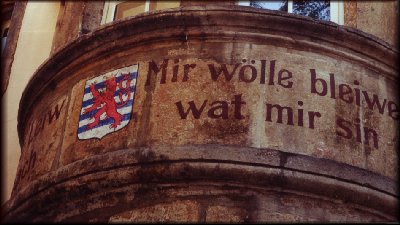
LUXEMBOURG & TRIER

LUXEMBOURG & TRIER
Dear All,
I have just returned from the Grand Ducky of Luxembourg. This is one of Europe's smallest countries, where its 400,000 inhabitants use French as the language of government and business, German for the newspapers, and Letzeburgesch, their ancient Germannic tongue, between each other. Located at the heart of Europe, tiny Luxembourg (4 times the size of Singapore...) has come under the rule of numerous powers - Spanish, Austrians, Dutch, Germans, French, etc. Despite that, it has always possess a strong independent streak. On many walls, one finds the phase "Mir welle bleiwe wat mir sin" - "We want to remain what we are".
I arrived on Friday night from London. Dumped my stuff and walked into town. It was close to midnight and yet the pubs and clubs were full of people - it looked as though most of the young Luxembourgers went having a great night out.
I woke up early the next morning and walked around the ancient towers (on one of which a nice elderly lady passed me a booklet on the Watchtower...the Jehovah Witness... which I promptly disposed off when she was out of sight) and fortifications of Luxembourg - once known as Gibraltar of the North. These strategic ramparts, hanging on the plateau-cliffs, were the guardian to Northern Europe, and they, together with the old historic centre of the city, are listed as UNESCO World Heritage sites. It was pleasant walking around the narrow alleys. The city appears to be self-contained, including the Grand Duke's Palace and the Parliament next door. It looks like a cosy neighbourhood and one could imagine bumping into the Prime Minister or the Grand Duke every other day in a nearby cafe. But someone told me that His Highness does not even speak Letzeburgesch, and lives somewhere in sunnier France.
In the afternoon, I joined a tour of the Ardennes. As we moved northwards, the rolling plains of southern Luxembourg gave way to the deeply wooded hills of the Ardennes. This was also the site of the Battle of the Bulge, one of the final battles of the WWII. We passed statues and monuments devoted to the American Army of General Patton. The Ardennes is also the land of knights, dukes, counts and bishop-princes. Ruins of castles crowned the dramatic hilltops and cliffs of this beautiful region. It is amazing seeing how landscapes can vary so much in this small country.
After the tour, I met my old LBS pal Antonello R. and his wife. They drove me around the suburbs of Luxembourg City, in particular, the European institutions and the Banking Centre. Luxembourg is one of the three centres of the fat Euro-bureaucracy and a major financial centre with over 200 banks. Most of the banks were located at a greenfied site near the Airport, with bland buildings that resemble no-frills put-on-your-space-suit hi-tech manufacturing plants at some industrial parks in the middle of nowhere. Luxembourg is an important private banking centre and wealthy individuals from neighbouring countries simply drive directly into the underground garages of these banks to deposit their untaxed cash, hidden from public view. We also walked through the hidden corners of old Luxembourg, down in the valley below the fortifications, before having a great meal and fine white wines from the Luxembourger Moselle, at a Franco-Luxembourger restaurant overlooking panoramically over the valley beneath.
On Sunday, I took a 45 minute train ride to Trier, Germany. This was Germany's first town, first founded by the Romans as the capital of the province of Gaul. They endowned the city with the famous Porta Negus (Black Gate), baths, an amphitheatre and other grand public buildings, many of which still stand or are adopted to other uses today. Trier's contributions to modern world history, however, relates to the birth in 1819 of a humble lawyer's son, Karl Marx, whose theories have changed the fate of nations and arguably brought about further development of human political thoughts, for better or for worse. I was tempted to sign the visitors' book with some two-cents-worth of wisdom as a "middle-of-road-pseudo-capitalist-closet-liberal-socialist", but found it surprisingly full of congratulatory comments from China. My intended contribution in lively Chinese characters would therefore have little novelty value, and in any case, I remembered late Chinese Premier Zhou Enlai's comments when asked about his thoughts on the French Revolution: "It's too early to judge"... I will leave it to historians of the new millennium instead.
OK, I'm home now... Bye for now. U will hear from me again from La Bellas Roma, in early July.
regards,
WeeCheng